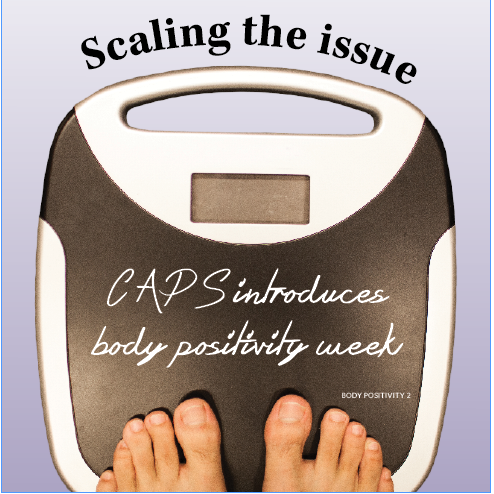CAPS introduces body positivity week

March 2, 2016
Junior Elisabeth Lyles recalls having her first disordered thoughts toward food at a very young age. It wasn’t until her junior year of high school that they developed into a full-blown eating disorder.
“I felt strong when I didn’t eat, like I had the tenacity and power to consume as little as possible and make, in turn, my body and stomach shrink down to nothing,” Lyles said. “That’s where some of the true motivations lie — desiring to shrink into absolutely nothing at all. … I could, or thought I could, visibly tell when my knees or elbows or collarbones looked more fleshed out after any regretful morsel of food.”
In retaliation to a rise in eating disorders in college students and a society in which media promotes a singular, unrealistic body standard, psychologist Leigh Miller and postdoctoral psychology fellow Rosette Elghossain from Tulane Counseling and Psychological Services teamed up with Tulane’s registered dietician Sara Walsh to organize “Dear Body Week.” From Feb. 22 to Feb. 26, students could participate in an array of activities centered around breaking down unrealistic portrayals of bodies and stopping negative body-talk, as well as discussing the consequences of body negativity such as eating disorders and body dysmorphia.
The week began with chalking on McAlister Drive and tabling inside of Bruff Commons, followed by a body positive photoshoot for Instagram. Students also had the option to decorate rocks and bookmarks with body positive messages on them. The week concluded with a screening of a TED Talk about overcoming negative body image and struggles with lifelong eating disorders.
A Tulane student who wishes to remain anonymous spoke about how the high concentration of women at Tulane exacerbated her eating disorder by creating a form of “competition” to stay thin.
“Because New Orleans has a culture of eating and eating and eating and Tulane, which is such a high percentage of girls that there’s more competition,” the student said. “There’s so much competition [to eat and] still be able to look amazing. And that’s kind of where the bulimia came in.”
According to the Walden Center for Education and Research, 40 percent of female college students have eating disorders. Tulane students are no exception.
There are no official statistics on how many Tulane students are treated for eating disorders, though Elghossain said they are prevalent in proportion to the amount of students who seek aid through CAPS.
“We at CAPS know that individuals in this phase of life are experiencing a great deal of transition surrounding identity and other important issues,” Elghossain said. “This can make them more at risk for having concerns around body image and eating behaviors.”
In order to properly address eating disorders on campus, The Eating Disorder Treatment Team, an interdisciplinary task force, composed of a psychologist, medical doctors and Walsh, has been assembled.
According to Elghossain, the team meets regularly and communicates with on-campus health professionals to ensure quality care is provided to students.
“Tulane’s campus has become increasingly aware of and open to discussing important mental health issues such as body positivity,” Elghossain said.
Foster Noone, sophomore and president of the Gender Exploration Society, said that despite body positivity being a topic of conversation on campus, Tulane’s general student body isn’t welcoming to students who do not fit a certain body mold.
“As an [institution] with a majority rich, white, cis[gender], straight students, I think beauty standards in general skew towards the dominant population, and it’s hard for body positivity movements to break out of those molds,” Noone said.
Emma Bassin, freshman and vice president of Tulane’s National Association of Mental Illness, said she agrees with Noone that body positivity often takes a narrow view of the issue.
“During my psychology lecture last semester, an entire unit was dedicated to discussing a variety of mental illnesses, including body image distortions,” Bassin said. “I think we still have a long way to go in order to find the most effective methods of treating body dysmorphia, especially among communities of LGBTQIA [individuals] and [people of color.]”
Elghossain said the best thing students can do to fight body image negativity is to support each other and deeply evaluate why certain beauty standards are held.
“Students at Tulane can continue to extend support to each other and engage in nonjudgmental, accepting conversations about body positivity,” Elghossain said. “It is also crucial to be aware of the influence media has on how we view and whether we accept ourselves and others.”
Lyles believes that overall, “Dear Body Week” works to break down the negative connotations surrounding individuals who have experienced disordered thoughts.
“I think Body Positive Weeks and National Eating Disorder Awareness Weeks work to de-stigmatize eating disorders,” Lyles said. “They show the light at the end of a sparse, dreary, all-consuming tunnel that can appear to go on endlessly.”
The anonymous student said that the efforts made by CAPS, though a start, were not enough and that larger strides must be made in the future to truly promote body positivity.
“I don’t think that they were big enough,” the student said. “You can’t just [say] here are all these activities in places people are never going to go to. Body positivity is only going to change if you make it so … everyone has to view it.”
If you believe that you or a peer may be suffering from an eating disorder or body dysmorphia, CAPS can be reached at (504) 314-2277 and is open 8:30 a.m. to 5 p.m. weekdays. Walsh can be reached at (504) 865-5255.
Illustration by Emilie Eliopoulos










Leave a Comment